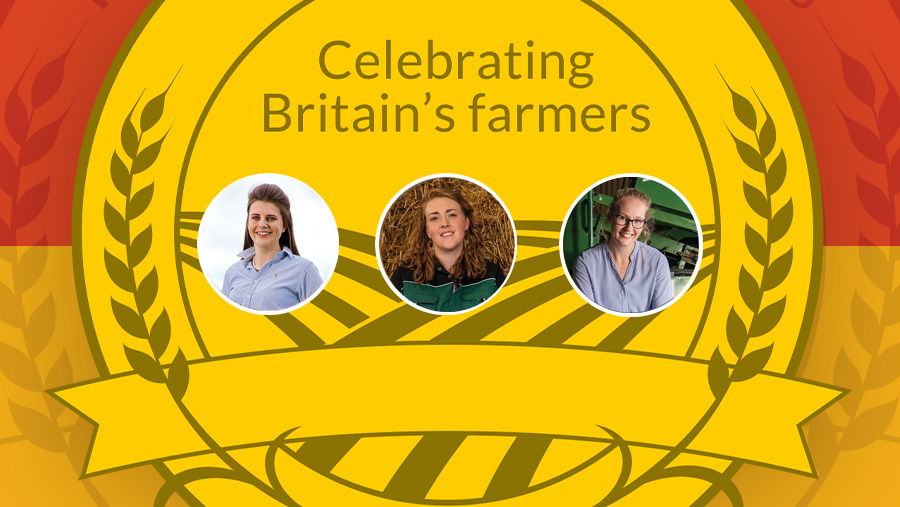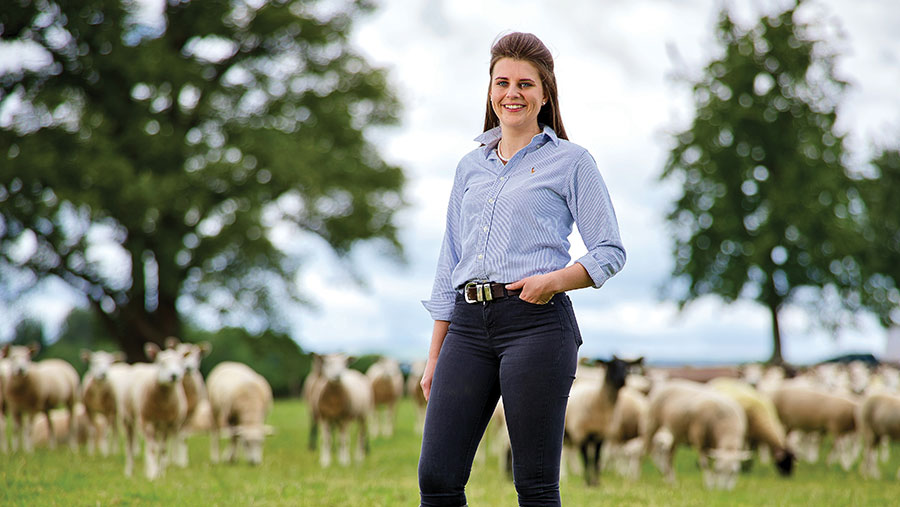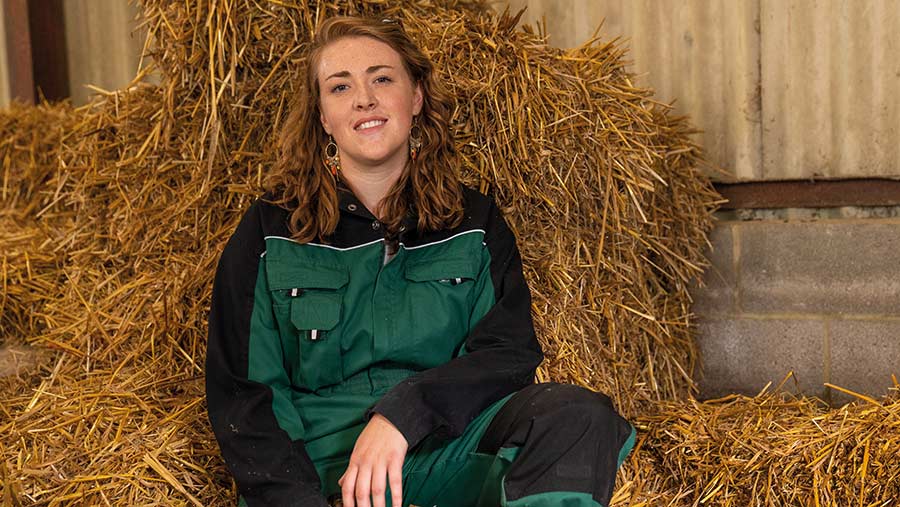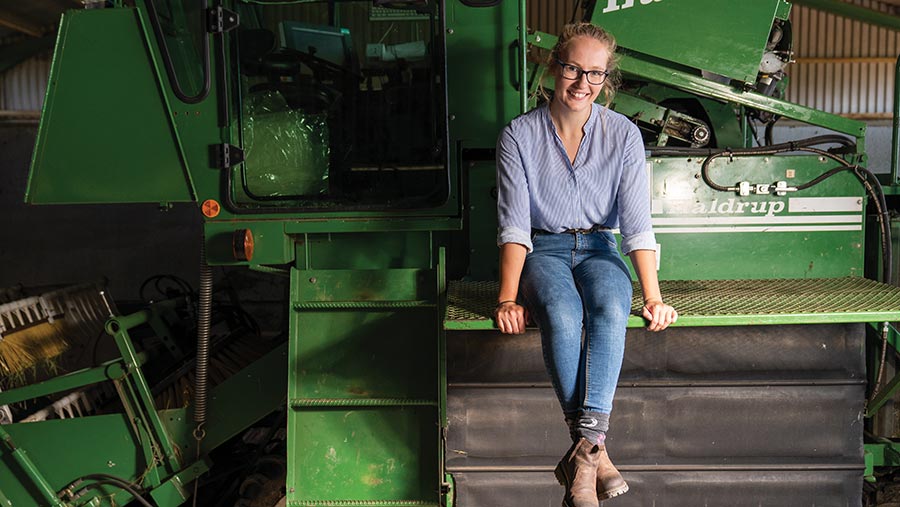Farmers Weekly Awards: Ag Student finalists 2020

Our trio of talented, hard-working students impressed with their fresh thinking, energy and enthusiasm.
Coupled with keen business brains, these finalists have all the essential ingredients to meet the challenges facing agriculture in the years to come.
See also: Farmers Weekly Awards: Young Farmer finalists 2020
The 2020 Ag Student of the Year finalists
- Emily Jones
How Caple, Hereford, Herefordshire - Rosa Linkens
Whitley Wood, Reading, Berkshire - Grace Welling
East Stratton, Winchester, Hampshire
The judges
- Alex Dunn
2018 Ag Student of the Year - Emma Northam
Farmers Weekly managing editor - Jack Hopkins
Independent judge and farm manager
Emily Jones
How Caple, Hereford, Herefordshire

Emily Jones © Richard Stanton
Despite growing up with pigs, sheep and chickens on her family’s smallholding, and helping out during holidays on her grandparents’ dairy farm, Emily Jones saw her future in acting rather than agriculture.
Then she joined her local Young Farmers’ Club at the age of 12, where she gained a whole new appreciation for agriculture’s role in the community – and beyond.
Today, Harper Adams student Emily has an infectious enthusiasm for the industry that shines through in everything she does. “I’ve always got my thumbs up,” says the self-confessed glass-half-full 21-year-old.
Student life
For business-minded Emily, studying Agri-Business was an obvious choice and she likes that the broad nature of the course gives her plenty of scope when it comes to future career options.
In 2018, she was elected chairman of Harper Forum – a rare honour for someone in only their second year. Her tenure, which she describes as a fantastic learning and networking experience, tested her skills in event co-ordination, planning and people management.
Such was her success as chairman, and willingness to go above and beyond, Emily was given the Extra Mile Award, which recognises students who commit to getting the most out of their time at university and helping to improve things for others.
Her empathetic streak is ever evident, from spearheading the #YFCLifeBlood donation campaign to understanding the social impact of the Covid-19 pandemic and the privileged position she is in living in the countryside.
Business know-how
To gain more hands-on experience and widen her career options, Emily has taken on a raft of lambing and livestock jobs, has worked in fresh produce and often finds herself grading spuds on her boyfriend’s family farm, where she lives.
But it was her third-year placement at Safety Revolution that opened her eyes to the sector she eventually wants to work in. She has embraced the opportunity to make a real difference in farm health and safety.
“People shouldn’t be going to work and not coming home,” she says, “and if we can put things in place to avoid that, we should.”
She admits there’s no quick fix, however. “It’s very much about working with people,” she says. “Ultimately you can’t expect someone to be doing something right, effectively or safely if you haven’t taught them how to do it in the first place.”
Her Harper Forum days stood Emily in good stead when it came to organising a programme of talks on the Safety Revolution stand at Lamma earlier this year.
Asked for their thoughts on the Farm Safety Zone, which Emily directly co-ordinated, 92% of delegates surveyed rated the content good or excellent.
The practical seminars on risk reduction proved particularly popular despite the lure of big kit. She believes contextualising potential problems by showing people how they can implement measures on their own farms is key to better safety.
What next?
It’s hard to imagine someone so astute and articulate struggling with her A-levels and getting into Harper with only minimum entry requirements. But with characteristic determination, Emily turned things around and now has a top-notch degree in sight this year.
“Making a difference” is a phrase Emily uses a lot; she stresses the importance of giving back, of helping and supporting others. We’re sure with her pioneering spirit and “boots on the ground” approach to farm safety, that’s exactly what she’ll do.
The judges say
“Positive, driven Emily is on a mission to ‘learn, lead and achieve’. She has a passion for improving farm safety, and wants to be a force for change in the community”
Summary
Student notes
• Studying at Harper Adams University
• Course Agri-Business
• Study year Third
• Favourite module Farm Assurance and Quality
• Ambition To make a positive difference to the industry’s poor health and safety record
• Fun fact Before she got the bug for agriculture, Emily wanted a career on the stage
Judges liked
• Positive, confident communicator – elected chairman of Harper Forum in second year
• Passionate about improving health and safety
• Grabs opportunities and goes the extra mile
• Hard worker who believes the more you put in, the more you get out
• Wants to make a difference in everything she does
Rosa Linkens
Whitley Wood, Reading, Berkshire

Rosa Linkens © Tom Askew-Miller
When Rosa Linkens told her careers adviser she was interested in farming, she was almost laughed out of the room by the response: Why would someone who’d been educated want to go into farming?
Given that reaction, it’s perhaps unsurprising she initially set off on a different path after her A-levels. But it took less than a term studying to become a primary school teacher for Rosa to know it wasn’t the right direction for her.
She quit the course and revisited the idea of a career in the farming sector.
Now, four years after embracing a degree in agriculture at Harper Adams University, 23-year-old Rosa feels her urban upbringing gives her a different perspective on farming that can help the industry combat misinformation and open up opportunities.
Student life
Rather than let her non-farming background put her on the back foot at university, Rosa decided to level the playing field by gaining as much practical experience in as many sectors as possible before starting her studies.
While her peers might have grown up on a farm and have more knowledge than her in one sector, she would be able to counter that with a broader understanding of the industry.
Over the next 10 months, Rosa got to grips with robot milking on a pedigree dairy farm, mucked in at a tenant beef, sheep and arable farm, worked on a free-range egg enterprise with batches of 44,000 hens and helped out on an indoor pig unit.
Her work placement year was also spent on a pig unit, and inspired her dissertation on the main barriers to recruitment and retention. It’s an area close to her heart, having been an outsider who initially felt daunted to enter the industry.
Intent on becoming a part of the agricultural community, Rosa got to know as many people as possible by throwing herself into activities outside her studies, from joining the off-road society to pulling pints in the student uni bar.
Business know-how
Of everything she’s achieved at university, Rosa is most proud of her Rural Business Opportunities assignment. Rather than pursue the well-trodden routes of dog walking or holiday cottages, Rosa focused on the emerging cricket protein market.
It’s a sustainable, low-carbon and scalable proposition: crickets have modest space, water and nutritional requirements, and can be fed on waste fruit and veg. By-products from the creation of the insect protein powder can even be used as fertiliser.
Rosa’s detailed business plan is something you could see Alan Sugar rubber-stamping. She already has serious interest in her proposal from Basingstoke farmer-cum-venture-capitalist Adrian de Ferranti, who agreed to become her “client” for the assignment.
Through the Midlands Agri-Tech Innovation Hub, she is currently accessing small business start-up support for market creation, branding advice and product development. Her aim is to establish a diversification franchise with guaranteed income that UK farmers can fall back on in hard years.
What next?
Rosa talks with great clarity about the challenges ahead for the industry in terms of subsidies, and the importance of change as well as the need for education. “I would like to be part of the new agriculture,” she says.
Whether that’s by developing sustainable protein products or working in recruiting to improve employee retention, you get the feeling Rosa will be helping a whole new generation discover the benefits of a farming career.
The judges say
“Having no links to farming has enabled Rosa to challenge accepted norms and bring fresh thinking. Her sustainable insect protein diversification is an inspired business idea with legs – literally!”
Summary
Student notes
• Studying at Harper Adams University
• Course Agriculture
• Study year Fourth
• Favourite module Business
• Ambition To create an insect protein industry that is accessible to UK farmers as a diversification to support their current enterprises
• Fun fact Rosa started building a Canadian canoe during lockdown and plans to paddle the length of the Thames once it’s finished
Judges liked
• Recognises honesty and transparency are needed to educate and inform farmers, as well as the public
• Sustainable insect protein business plan, which made the finals of the Pinnacle Farming Awards
• Tenacious and determined approach to everything she does
• Challenges herself to step outside of her comfort zone
• Hands-on, practical approach to learning about farming
Grace Welling
East Stratton, Winchester, Hampshire

Grace Welling © Tom Askew-Miller
“I’m a bit of a geek when it comes to weed identification,” says 23-year-old Grace Welling, who has known from a young age that she wanted to become an agronomist like her father.
After getting her Apha licence under her belt at just 18, she has secured, through her Agriculture with Crop Management course, the funding to complete her Basis and Facts qualifications.
Being a member of YFC since she was 10 has given Grace a love of animal husbandry too, and she hopes in the future to start up a small Charollais ram-breeding enterprise on a bit of local pasture.
“An agronomist is a farm adviser at the end of the day, and if you know something about every part of the business, it really helps.”
Student life
Grace didn’t grow up on a farm, and has worked hard to gain hands-on experience before starting at Harper Adams. “I knew I was effectively 14 years behind on a lot of the farm experience others would have,” she says.
So she took a job at a local mixed farm and tried her hand at every role, from pigs, sheep and cattle to crop husbandry and basic mechanics.
Since then she has worked on farm every holiday during the university year, helping out with lambing at Easter and milking during the summer as well as working on a Niab trials site.
Getting stuck in is a running theme with Grace. She has championed both university life and an agricultural education through her roles as Student Ambassador and Course Representative. “I really liked Harper and thought more people should come,” she says.
A scholarship placement with Syngenta’s Crop Protection team saw Grace spending 12 months on crop protection trials. She also helped to organise the Sprays & Sprayers Arena at Cereals last year, staying positive despite the epic rain, mud and wind.
Business know-how
Back home, Grace is heavily involved in the family Christmas tree business, where she and her brother share the role of head buyer. In 2013, the pair introduced decorations sales, which now achieve £30,000/year, while tree sales have grown from 300 a season to 4,000.
They have ambitions to grow sales further using social media to help promote stock and encourage more buyers to visit.
Grace manages the tree sales team – a role that has helped develop her people-management skills. But, unsurprisingly, the plant science side of the business is her favourite part; she now has very specific knowledge of Nordmann fir and Norway spruce agronomy.
What next?
“I don’t think you’re ever done,” says Grace, whose hard work has ensured a first-class degree is well within her grasp.
Her future now lies at Germinal, where she has secured a role working in grass seed production. It might be a niche career choice, but Grace is someone who always sees the bigger picture. “We have to keep prioritising innovation so we can minimise climate change but maximise production,” she says.
“I’m particularly interested in the work that goes on with rumen studies in terms of manipulating bacteria in the gut to see if you can reduce methane emissions the other end – and potentially increase feed efficiency.
“I don’t want to be out of touch with the animal husbandry side, as I am focusing on grassland and for most of the farmers I’ll be talking to, their priority will be the livestock, not the crop.”
The judges say
“Motivated by the belief that she can always do better and learn more, Grace is a very focused individual who has her sights set on a future in grass seed production”
Summary
Student notes
• Studying at Harper Adams University
• Course Agriculture with Crop Management
• Study year Fourth
• Favourite module Applied Crop Protection
• Ambition To become an independent herbage adviser
• Fun fact Grace competes in the Brown Candover Tug of War Club in her spare time and has recently carried out some landscaping around the team training rig to get it into good condition for post-Covid-19 training
Judges liked
• Put herself forward for Student Ambassador and Course Representative
• Secured course clothing for second-year students and £4,000 sponsorship
• Achieved her Apha licence for herbage crop inspection at 18
• On course to get funding to complete her Facts and Basis qualifications
Sponsor’s message
 “Young people are the lifeblood of the food and farming world and we need to encourage the next generation of talent – something we are passionate about at Heck as the average age of our team is around 27. We came from farming stock and our HQ is on 320ha of family arable land”
“Young people are the lifeblood of the food and farming world and we need to encourage the next generation of talent – something we are passionate about at Heck as the average age of our team is around 27. We came from farming stock and our HQ is on 320ha of family arable land”
Andrew Keeble, co-founder, Heck Food
